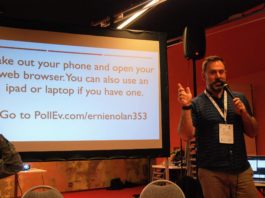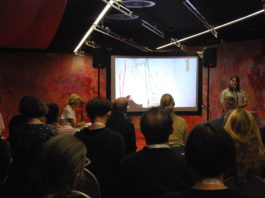Theatre is more important than ever. Dr Ekua Ekumah, the Keynote Speaker for Tuesday’s opening address of the ITYARN (International Theatre for Young Audiences Research Network) Conference, began by speaking of the importance of staging Theatre beyond conventional, formalised performance spaces.
Dr Ekumah relates the future of Theatre to the fate of humanity. Specifically, this draws her to consider how the Arts can, and should, be used for the sake of reviving and sustaining our planet. As such, she advocates for Theatre makers to move beyond purely aesthetic considerations in order for their work to inhabit a more functional and deliberative social role. With her vision for Theatre to be used as a tool for social change and transformation, she argues that Theatre must live and breathe within the formal Education system. Young People, she indicates, are the fate of humanity.
“I ha[ve] a responsibility to make an impact on the world I’m living in” – Dr Ekua Ekumah
Furthermore, she ar gues that, in order to connect with audiences who do not typically have access to the theatrical world, artists must extend their reach within both global and local communities. Nonetheless, she cautions that they must be careful with the kind of Art they create, so as not to cause any disruption or ‘debris.’ With the Arts being so intimately connected with the very nature of what it means to be human, she argues that any artistic production made without careful, thoughtful intention and purpose can lead to more harm than good. She highlights that this risk, inherent within Theatre making, may be especially heightened within the context of creating work for Children and Young People, as their theatrical experiences can be especially formative to the development of their worldview.
gues that, in order to connect with audiences who do not typically have access to the theatrical world, artists must extend their reach within both global and local communities. Nonetheless, she cautions that they must be careful with the kind of Art they create, so as not to cause any disruption or ‘debris.’ With the Arts being so intimately connected with the very nature of what it means to be human, she argues that any artistic production made without careful, thoughtful intention and purpose can lead to more harm than good. She highlights that this risk, inherent within Theatre making, may be especially heightened within the context of creating work for Children and Young People, as their theatrical experiences can be especially formative to the development of their worldview.
In the current era of tumultuous politics and social unrest, Dr Ekumah’s reflections demand that artists be conscious of how, why and what they create. In order to affect positive change and empower Youth, she advocates reaching out to those Young People without regular access to Theatre and the Arts. Without the input, perspective and support from all Youth, no matter who they are or where they live, she suggests there is no hope for change.







